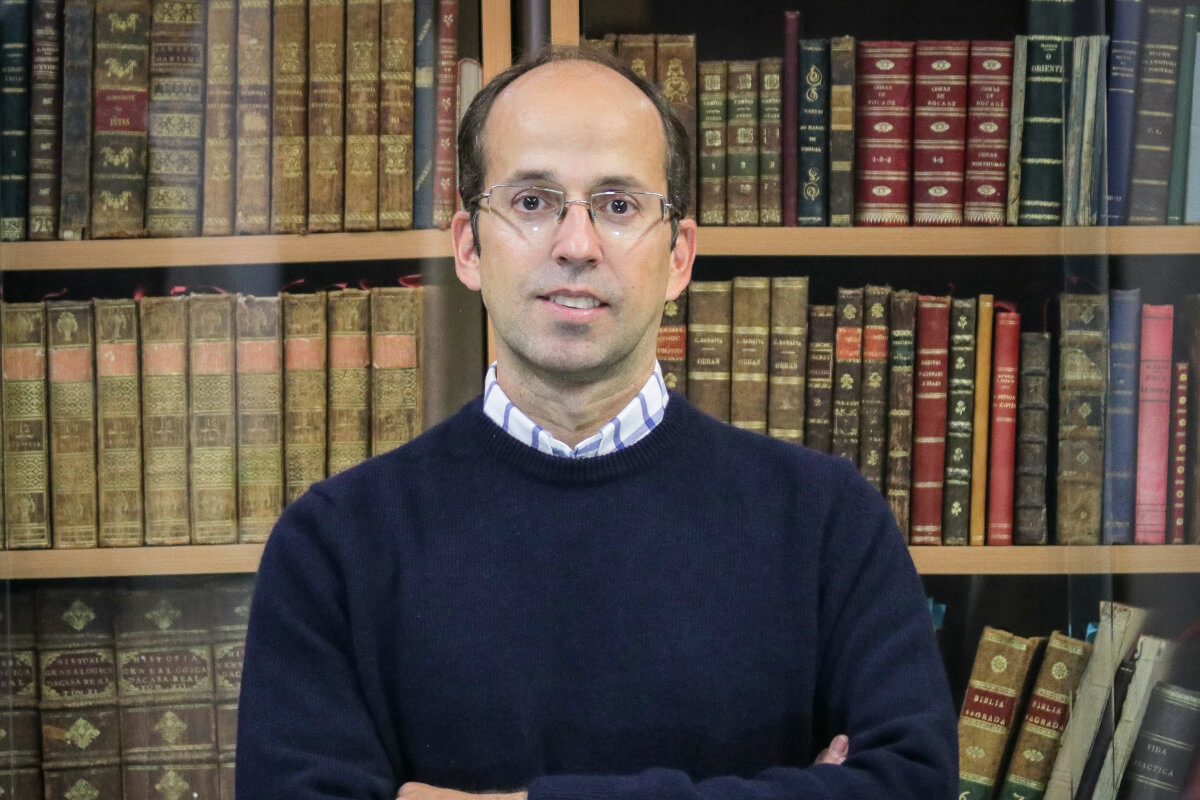Quintino Lopes

History of Science, Technology, and the Environment
Contact:
qmjl@uevora.pt
Biography
Quintino Lopes is the Principal Investigator (PI) of the Foundation for Science and Technology-funded R&D project PHONLAB — Phonetics Laboratory: Coimbra – Harvard. Rethinking 20th-century scientific centres and peripheries, leading a team of 13 researchers attached to the Universities of Évora (Portugal), Coimbra (Portugal), Porto (Portugal), Stockholm (Sweden) and Macau (China).
Lopes is the scientific coordinator of the IHC’s Research Group on History of Science, Technology and the Environment (NOVA University Lisbon / University of Évora), leading a team of over 40 researchers. He acted as an expert reviewer for the European Research Council (ERC) Consolidator Grant 2025 call. In 2024, he worked at Stockholm University as a visiting researcher. He has received three international awards.
In 2025, he was awarded an Assistant Researcher contract from the Foundation for Science and Technology, under the auspices of the competitive Individual Call to Scientific Employment Stimulus.
Research fields
- Contemporary history
- History of science
- Comparative and transnational history
- Military dictatorship / Estado Novo
Selected publications
- Pereira, Elisabete, Catarina Simões & Quintino Lopes (Coords.). “Colonial and post-colonial collections in Portugal: reconstructing trajectories and rethinking narratives,” História, Ciências, Saúde-Manguinhos 32 (2025) (Special Issue). [link]🔓
- Lopes, Quintino, Francisco de Lacerda & Ana Simões. “Armando de Lacerda and the Coimbra Phonetics Laboratory, 1930–1979: Cross-National Mobility and Exchange in a Global Context,” Centaurus 66 (2024): 319-350. [link]🔓
- Lopes, Quintino. The global periphery: Armando de Lacerda and the Coimbra Experimental Phonetics Laboratory (1936-1979). Stockholm: The Royal Swedish Academy of Sciences, 2023. [ToC]
- Lopes, Quintino & Elisabete J. Santos Pereira. “Science funding under an authoritarian regime: Portugal’s National Education Board and the European ‘academic landscape’ in the interwar period,” Notes and Records (2021): http://doi.org/10.1098/rsnr.2021.0037 [link]🔓
Main projects
- Coordinator of the project ‘PHONLAB — Phonetics Laboratory: Coimbra – Harvard. Rethinking 20th-century scientific centres and peripheries‘ — Hsted by the IHC — University of Évora and funded by the Foundation for Science and Technology (2022.06811.PTDC). 2023-2026 [link]
- Researcher in the project ‘CISDNE — El proyecto de cooperación intelectual de la Sociedad de Naciones. Presencia española e iniciativas afines‘ — Coordinated by Álvaro Ribagorda (Universidad Carlos III de Madrid) and Leoncio López-Ocón (Instituto de Historia — CSIC) and funded by the Spanish Ministry of Science, Innovation, and Universities (PID2022-141696NB-I00, MCIU/AEI/10.13039/501100011033). [link]
- Researcher in the project ‘TRANSMAT — Transnational materialities (1850-1930): reconstituting collections and connecting histories’ — Coordinated by Elisabete Pereira (IHC — University of Évora) and funded by the Foundation for Science and Technology (PTDC /FER-HFC /2793/2020). 2021-2025 [link]
- Team member of the project “Desafíos educativos y científicos de la Segunda República Española: internacionalización, popularización, innovación en universidades e instituto” — Coordinated by Leoncio López-Ocón (Instituto de Historia — CSIC) and Álvaro Ribagorda (Universidad Carlos III de Madrid), and funded by the Agencia Estatal de Investigación (Spain) (PGC2018-097391-B-I00). 2019-2022 [link]
Search
Events
março, 2026
Tipologia do Evento:
Todos
Todos
Colloquium
Conference
Conference
Congress
Course
Cycle
Debate
Exhibition
Launch
Lecture
Meeting
Movie session
Open calls
Opening
Other
Presentation
Round table
Seminar
Showcase
Symposium
Tour
Workshop
- Event Name
seg
ter
qua
qui
sex
sab
dom
-
-
-
-
-
-
1
2
3
4
5
6
7
8
9
10
11
12
13
14
15
16
17
18
19
20
21
22
23
24
25
26
27
28
29
30
31
Não Existem Eventos
News
VINCULUM — An end and a new beginning
Feb 24, 2026
FCSH hosted the closing session of the VINCULUM project
In March, Lisbon becomes the Capital of International Intrigue
Feb 21, 2026
Between 2 and 31 March, at the Portuguese Cinematheque
Anita Buhin is on a research mission in Italy
Feb 20, 2026
She is now a Visiting Researcher at CAST, University of Bologna
CONTACTS
WORKING HOURS



